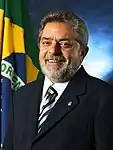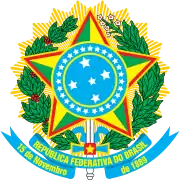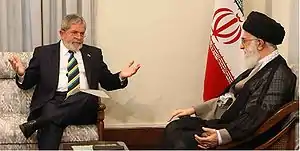卢拉主义
卢拉主义(葡萄牙語:)是指2006年以前对社运和劳工党怀有敌意的巴西社会各阶层在时任总统路易斯·伊纳西奥·卢拉·达席尔瓦领导下确立的意识形态[16]。思想中,受限的改良主义和有限的结构变革侧重于贫困阶级[17]。与卢拉保持距离的下层阶级在卢拉第一任期届满后投票使他在中产阶级的反对下获得候选人资格。将维护国家稳定与国家分配主义统一起来的说辞和实践是卢拉主义的起源[16]。卢氏在提倡社会主义的同时,追求一种以市场为导向逐步解决贫富差距的“社会自由主义”方式[3][18]。
卢拉主义 Lulismo | |
|---|---|
 卢拉主义标志 | |
| 领袖 | 路易斯·伊纳西奥·卢拉·达席尔瓦 |
| 创始人 | 路易斯·伊纳西奥·卢拉·达席尔瓦 |
| 成立 | 2003年 |
| 党员 | 劳工党 |
| 意識形態 | |
| 政治立場 | 中间偏左[A][13][14] |
| ||
|---|---|---|
|
第三十五届巴西总统
第三十九届巴西总统
丑闻和争议
总统选举
|
||
| 系列条目 |
| 進步主義 |
|---|
|
巴西制造商、银行和零售商因“以消费为主导、以信贷为动力”的政府经济模式而受益[19]。安德烈·辛格称由此提出了“卢拉主义”:
| 以私营工业部门为一方,以有组织的劳动力为另一方的利益趋于一致,继而取得平衡,也就使这套政治制度能够以某种共识落实[20]。 |
这种平衡使政府逐渐在政策上做出重大改变。在卢拉主义运动中,不对抗是发展的必要条件。上文所述内容是拉美21世纪社会主义浪潮的一部分[21]。
确立
“卢拉主义”一词由政治学家安德烈·辛格所制,他在2003年至2005年担任卢拉的新闻秘书,并在2002年至2007年任总统发言人[17][22][23][24]。在卢拉于2001年放弃劳工党左翼路线后,他于2002年总统竞选中提出了“卢拉主义”[16] ,并扬弃了组织和动员的概念。由于卢拉主义谋求在秩序中实现变革,因此不必动员,冲突自然也不复存在[23]。
2009年为千禧研究所撰写的一篇文章称,在“卢拉主义推行六年”之后,“自由主义者被逼上梁山”。帕特里夏·卡洛斯·德·安德拉德认可该论点:“据她表示,‘自由’一词在巴西被视为‘右翼’或‘支持军事独裁’的同义词。辛格说,在舆论战中,所谓的左派总占上风[25]。”
卢拉主义寻求卢拉与巴西保守派之间的和解[23][26]。讽刺的是[27],这套本就保守的社会契约将费尔南多·恩里克·卡多佐(1995年至2002年执政)的经济政策与卢拉政府(2002年至2010年执政)的分产政策合二为一[22]。
在和解的支持下[28],卢拉主义代表着“社会冲突的缓和,资产阶级一直[都]极度惧怕,尤其是在像巴西这样的阶级分明的国家”,因为它设想“在软弱的改革主义的支持下遏制贫困和不平等现象的蔓延”[27]。这种社会变革模式被解释为“现代化的保守变体”,其中国家“在利用最贫困人口方面发挥着突出作用”,以免使巴西的社会阶层发生巨变(换句话说,以免与保守精英发生经济利益冲突)[28]。卢拉主义“炮制出新的意识形态、联盟不足的旗帜,似乎结合了”卢拉和卡多佐政府基于三大支柱的宏观经济政策的连续性,即通胀控制、浮动汇率和预算盈余[16]。
将卢拉主义视为政治运动的另一个特征是它的无党派性。但该思想的概念与政党重叠,包括卢拉一手创立的劳工党[29]。
巴西政坛在后来发生了一连串事件(譬如弹劾迪尔玛·罗塞夫被弹劾、卢拉于2018年4月7日被捕以及米歇尔·特梅尔劳动法改革)[30],一些政治评论员就此正在争论卢拉主义的下一阶段,如今这套思想变得更激进,更左倾[31]。
参考文献
- Samuels, D. (2004). From Socialism to Social Democracy: Party Organization and the Transformation of the Workers’ Party in Brazil. Comparative Political Studies, 37(9), 999–1024. https://doi.org/10.1177/0010414004268856 (页面存档备份,存于)
- . [29 December 2021]. (原始内容存档于2021-12-19).
- Alejandro M. Peña (编). . Springer. 2016: 240 [2023-01-16]. ISBN 9781137538635. (原始内容存档于2023-01-14).
In this manner, while the social liberalism of Lulismo favored the agenda of the local actors advancing sustainability and CSR projects in Brazil, and further tilted the discursive field in favor of the transnational sustainability ...
- Francisco Luiz Corsi; José Marangoni Camargo; Agnaldo dos Santos; Rosângela de Lima Vieira (编). . Editora Oficina Universitária. 2014.
- Giuseppe Cocco; Bruno Cava (编). . Lexington Books. 2018: XIX [2023-01-16]. ISBN 9781498526678. (原始内容存档于2022-11-08).
- Gomercindo Rodrigues (编). . University of Texas Press. 2009 [2023-01-16]. ISBN 9780292774544. (原始内容存档于2022-10-07).
Later, as the military regime waned, he was one of the national founders of the Workers' Party (PT), personally allying with the urban union leader, now president of Brazil, Luiz Inacio Lula da Silva. He, Lula, and the PT in turn allied themselves with the cause of democratic socialism around the world.
- John Ashley Soames Grenville (编). . Psychology Press. 2010: 702 [2023-01-16]. ISBN 9780415289559. (原始内容存档于2022-10-06).
Lula da Silva set out to show that contemporary 'liberal socialism' can work with the market and capitalism for the benefit of all the people, while promoting public serviccs.
- . NACLA. [2022-03-16]. (原始内容存档于2022-12-05) (英语).
- Oliveira, André de. . El País. 28 January 2018 [10 June 2018]. (原始内容存档于2022-12-05) (Portuguese).
- Schreiber, Leon Amos. (学位论文). Stellenbosch University. 2011 [8 November 2016]. (原始内容存档于2016-11-09).
- Luiz C. Barbosa (编). . Routledge. 2015: 43. ISBN 9781317577645.
Lula da Silva's form of economic liberalism can be classified as “socialist neoliberalism.” This means that one uses the wealth generated by the market to finance social programs to lift people out of poverty.
- C. Wylde (编). . Palgrave Macmillan. 2012: 206. ISBN 9780230301597.
In Brazil Lula too adopted fiscally conservative policies
- Claire Rigby (14 November 2016). "How Lula's party fell from grace: the toppling of the Brazilian left" (页面存档备份,存于). New Statesman. Retrieved 20 July 2017.
- Daniel Gallas (29 March 2016). "Dilma Rousseff and Brazil face up to decisive month" (页面存档备份,存于). BBC News. Retrieved 20 July 2017.
- . France 24. 12 June 2021 [21 January 2022]. (原始内容存档于2023-01-27).
Upon his return to Brazil, and ahead of an upcoming trip to the United States, Lula will continue to make full use of the electoral strategy that won him the presidency in 2002: Talking to a variety of people, and negotiating with and rallying political forces beyond his Workers’ Party (PT), particularly from the centre of the political spectrum.
- Singer, André. [Social and ideological roots of Lulism]. Novos Estudos - CEBRAP. 2009, (85): 83–102. doi:10.1590/S0101-33002009000300004
 (Portuguese).
(Portuguese). - . Links International Journal of Socialist Renewal. 23 June 2013 [30 September 2015]. (原始内容存档于2022-01-15).
- Richard Sandbrook (编). . Cambridge University Press. 2014: 155.
... President Luiz Inácio (Lula) de Silva during his first term (2003–6) followed social-liberal policies ...
- Casanova & Kassum 2014,第32頁.
- . Brazilian-Norwegian Chamber of Commerce. [30 September 2013]. (原始内容存档于2018-08-13).
- . Brazilian-Norwegian Chamber of Commerce. [30 September 2015]. (原始内容存档于2018-08-13).
- Werneck, Paulo. . Folha de S. Paulo. 19 August 2012 [8 October 2018]. (原始内容存档于2022-10-12) (Portuguese).
- Galhardo, Ricardo. . Último Segundo. 30 September 2012 [8 October 2018]. (原始内容存档于2018-09-22).
- . NorLARNet. 11 April 2013 [30 September 2015]. (原始内容存档于2018-08-13).
- Allan, Ricardo. . Instituto Millenium. 3 June 2009 [28 December 2012]. (原始内容存档于2013-11-08) (Portuguese).
- Gindre, Gustavo. . Viomundo. 28 June 2013 [8 October 2018]. (原始内容存档于2022-10-07) (Portuguese).
- Becker, Fernanda; David, Anthony. . Brasil de Fato. 3 January 2013 [8 October 2018]. (原始内容存档于27 September 2013) (Portuguese).
- Keinert, Fábio Cardoso. [The meanings of Lulism: gradual reform and conservative pact]. Tempo Social. November 2012, 24 (2): 255–260. doi:10.1590/S0103-20702012000200014
 (Portuguese).
(Portuguese). - Duarte, Rachel. . Sul 21. 7 October 2010 [24 October 2010]. (原始内容存档于2017-09-13) (Portuguese).
- . 4 July 2017 [8 October 2018]. (原始内容存档于2021-03-02) (葡萄牙语).
- Oliveira, André de. . El País. 28 January 2018 [10 June 2018]. (原始内容存档于2022-12-05) (Portuguese).
- . O Globo. 23 June 2011 [28 April 2012]. (原始内容存档于2023-01-16) (Portuguese).
参考书目
- Casanova, Lourdes; Kassum, Julian. . Palgrave Macmillan. 4 June 2014 [13 August 2015]. ISBN 978-1-137-35236-1.
- Ricci, Rudá. . Fundação Astrojildo Pereira. 1 January 2010 [12 August 2015]. ISBN 978-85-89216-28-9.
- Singer, André. . Companhia das Letras. 30 August 2012 [12 August 2015]. ISBN 978-85-8086-358-1.
.jpg.webp)

